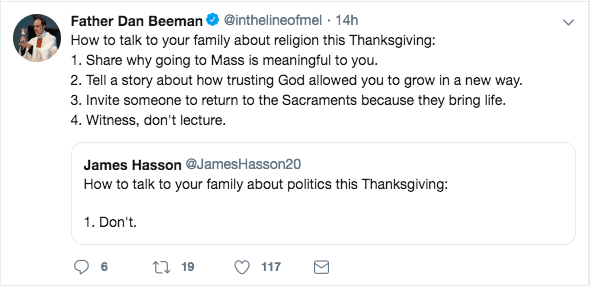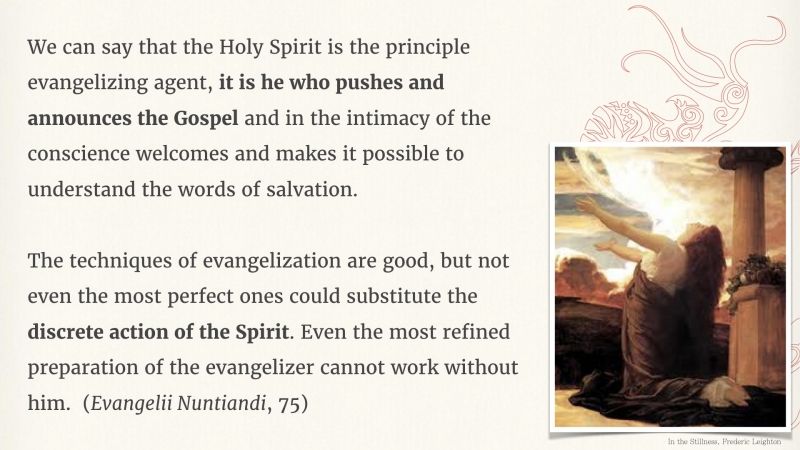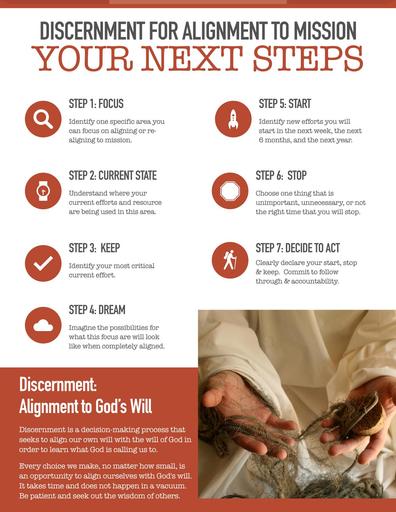Fr. Dan Beeman, a priest and pastor from Norfolk, VA shared some tips on social media for navigating conversations about faith and spirituality at your Thanksgiving gatherings.
Sometimes we feel like our family and friends can get "sick" of hearing us talk about our faith. Even the most open-minded, prayerful, and loving comments we make and stories we share can be perceived as judgement and lecture. Just mentioning the slightest thing about spirituality and faith seems to cause certain family members to shut down or roll their eyes. We, in turn, find ourselves getting defensive and avoiding the topic completely - often feeling like we can't be authentic and true to ourselves. It's a vicious cycle of judgement, defensiveness, and silence that leads to cultural maxims like: "We just don't talk about religion here."
Fr. Beeman's suggestions are great if you don't have anyone actively hostile or defensive (on either side of the faith discussion) sitting at your Thanksgiving table. But what can you do if you feel like anything you say related to faith and spirituality is outright ignored, causes anger, inflates tension beyond bearable levels, or is openly mocked?

These very real situations will play themselves out across dining room tables, around card games, and during the football game commercials around the country for the next few days. And so, we humbly submit some additions to Fr. Dan's list:

5. LISTEN
Genuine listening and connection can begin to overcome the visceral reactions from all of us when it comes to discussions of religion, faith, and spirituality.
Instead of sharing and commenting, try asking and listening. Ask a family member what his or her experiences of God has been in their life. Then, just listen to what they share without comment or correction (no matter how inflammatory their opinions or theologically wrong their perceptions).
Listen to their experience and their story with the eyes and ears of Jesus.
Listen for the real pain, brokenness and hurt that you find in their story, and ask Jesus to soften your heart in compassion and empathy for what they have been through.
Listen for God's subtle, quiet workings, and allow yourself to be fascinated by the way He’s working in the life of another person - even if they don't notice or recognize Him.
Listen with gratitude for the gift of family, friendship, and fellowship. And when they've finished - no matter how long or short their sharing is - simply thank them for sharing.
6. PRAY AND WAIT
Then wait before sharing your own story, commenting on theirs, offering to pray for them, or responding with anything other than a genuine, "Thank you for sharing."
Wait for the subtle movement of the Holy Spirit to prompt you on what to say or do in response to their sharing. Pray and listen to how He desires you to be His instrument - setting aside how YOU want to be that instrument.
If you’re not sure how to begin, or if your Thanksgiving table feels a little awkward this year, you might appreciate our reflection on How to Pray an Authentic Thanksgiving Prayer (Even When the Table’s Awkward) — with simple, real-life prayers for every kind of family moment.
Sometimes I get in the way of the Holy Spirit's workings. I get so excited about the knowledge of my faith that I have received over the years that I am bursting with the desire to share that knowledge with someone else. Or I become overwhelmed with compassion and empathy and feel like I simply cannot help but to offer an "in the moment" prayer for their needs. Other times, I launch into my own prepared witness without bothering to ask the Holy Spirit if the time is right - or the other person if the want to hear it.
How to prepare
You'll likely spend the days and hours leading up to Thanksgiving preparing - cooking and baking, cleaning your home, decorating, putting up all the breakables, packing your suitcases, etc. Take some time to prepare for more than the meal - get yourself ready for the evangelizing moments that will come as well!

Pray
Sometimes the Holy Spirit works in the heart of the one you are sharing with, inspiring him or her to ask a question that invites further conversation. Sometimes He works in your own heart, quietly suggesting a thought or question that may be exactly what he or she needs to hear. Sometimes He works by encouraging you to remain silent, simply thanking them for their story and moving the conversation to another topic.
- Pray for the people you will gather with this Thanksgiving.
- Pray for their hearts to be open to the witness of Jesus that you bring with you.
- Pray for your own heart to be open so that you are able to see the way God is working in each of their lives.
- Pray against defensiveness, cynicism, and anger - in yourself and others.
- Spend some time in quiet listening to the Holy Spirit and practice recognizing His promptings in your heart.
The key is to be a person of prayer who recognizes the workings and promptings of God.
Know Your Story
Often, asking someone to share their experience opens them up to receiving someone else's story - sometimes that ask is dictated just by basic manners. If they ask for you to share in return, be ready. How can you sum up succinctly and meaningfully what difference Jesus has meant to your life? Keep your story focused on what Jesus has done, not what you have done.
Practice Spontaneous Vocal Prayer
Sometimes, particularly when I encounter brokenness and hurt in someone's story, the Holy Spirit prompts me to pray - not just FOR that person, but WITH them. An 'in the moment' spontaneous and specific prayer offered aloud for someone's suffering can be a powerful tool for helping them to experience God's love for them. It's often easy for us to say, "I'll pray for you" in response to that hurt, but how much more meaningful it is to say, "Can we pray for that right now together?" However, the Holy Spirit often asks us to move outside of our comfort zones in order to be his instruments most fruitfully. Disciples have to get comfortable with being uncomfortable.
This handout from the Diocese of Green Bay can be a super helpful format if you are not comfortable with spontaneous vocal prayer. Practice it with someone before you head to Thanksgiving gatherings.
pdf Share Prayer: A Quick Guide to Intercessory Prayer(191 KB)
Have Confidence in Yourself and in God
You can do it! You can change your family's experience of faith and spirituality conversations and create a new context by which people are heard, their stories and experiences are honored and respected, and everyone's faith is strengthened by being able to witness God moving in another's life.
Remember that each person you encounter - from crazy Aunt Carol, to the angsty and defiant teenager, to your Wiccan cousin - is sacred ground. The Holy Spirit is already present, working and moving in their lives. If the only thing you are able to do this Thanksgiving is silently witness to His work in the lives and hearts of others, then that truly is a reason to give thanks!

After your dinner is over, please come back and share God's glory stories in the comments! Let us know how you were able to successfully and intentionally bring Jesus into your Thanksgiving conversations.
You might also like:
How to Pray an Authentic Thanksgiving Prayer (Even When the Table's Awkward)
10 Tips for Accompaniment in a Divisive Political Climate

